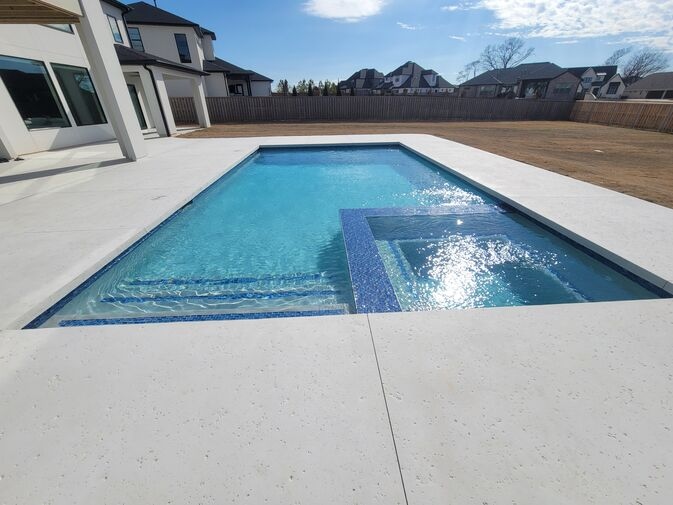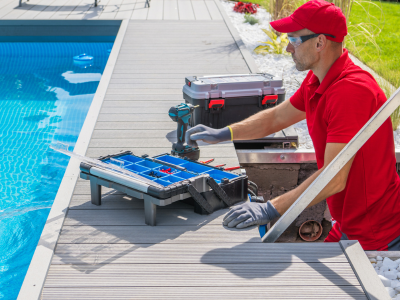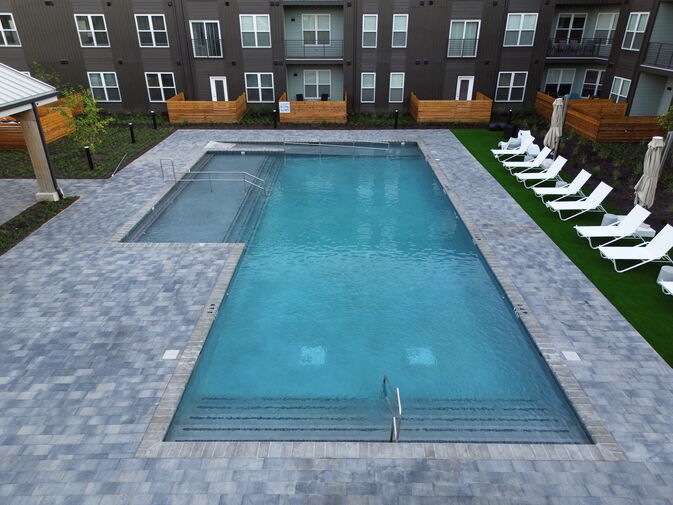In 2025, an increasing number of homeowners are considering the long-term benefits of various pool systems. One of the most significant decisions is choosing between saltwater and chlorine pools. Both options can provide you with clean, clear water, but they work in different ways and come with various advantages and disadvantages.
Choosing the right system affects more than just the appearance of your pool. It changes your weekly maintenance, how the water feels on your skin, and even the amount of money you spend over time. If you plan to build a pool or upgrade your current setup, understanding the key differences can help you make the best decision for your home.
How Saltwater and Chlorine Pools Work

Both types of pools utilize chlorine to maintain water cleanliness. The primary difference lies in how chlorine is added and maintained.
- A saltwater pool uses a salt chlorine generator. You pour pool-grade salt into the water. The generator turns that salt into chlorine through electrolysis. That chlorine then sanitizes the water. After performing its function, it returns to its original state as salt, and the cycle continues.
- A chlorine pool requires manual addition of chlorine. You can use tablets, liquid, or granules. The chlorine kills bacteria and prevents algae from forming, but the levels must be regularly tested and adjusted.
Even though saltwater pools create chlorine, they do it more slowly and consistently. This gives the water a softer feel and helps maintain more stable chemical levels.
Initial Cost of Installation
The cost to install a pool system depends on what type you choose. If you are comparing prices in 2025, here’s what to expect:
- Saltwater pools cost more upfront. You need to purchase the salt chlorine generator, which ranges in price from $1,500 to $2,500. Additionally, you may need upgrades to your pump or plumbing, as well as professional installation.
- Chlorine pools are less expensive to set up. You do not need special equipment, and most systems are ready to use as soon as you add the chemicals.
Ongoing Maintenance and Cost
This is where saltwater pools shine. Once the system is operational, the generator handles most of the chlorine production. You still need to test the water weekly and add salt occasionally, but you are not constantly buying chemicals.
The main maintenance task is cleaning the salt cell. Over time, minerals accumulate inside the generator, and it will need to be cleaned every few months. The salt cell usually needs to be replaced every 3 to 7 years and costs between $300 and $800.
Chlorine pools require more effort week to week. You must test chlorine levels frequently and adjust them as needed using chemicals. You will also need to “shock” the pool regularly, especially after heavy use or rain. These chemical costs add up.
If you track your pool maintenance cost over five years, a saltwater pool can be more affordable than a chlorine system.
How the Water Feels
Many pool owners care about how the water feels on their skin, and this is where saltwater pools offer a noticeable difference.
- The water in a saltwater system is smooth and soft. It is easier on the eyes, skin, and hair. Most swimmers find it more pleasant and describe it as feeling similar to a spa or a mineral bath.
- In a chlorine pool, the water can feel harsher. High chlorine levels often lead to red eyes, itchy skin, and a strong chemical smell. Swimmers may also notice faster wear on swimsuits and hair color.
Health and Skin Sensitivity
Both pool types can be safe, but people with sensitive skin or allergies often notice a difference.
Saltwater pools use lower levels of chlorine and keep it more stable. This makes them a better option for people with dry skin, eczema, or mild asthma. The water has fewer chloramines, which are the byproducts that cause irritation and strong odors.
Chlorine pools can be safe as long as the water is well-balanced and properly maintained. However, if the chlorine level becomes too high or too low, it can cause eye irritation, skin dryness, or breathing difficulties.
For families with young kids, elderly swimmers, or anyone with allergies, a saltwater pool is often the safer and more comfortable choice.
Water Balance and Sanitation
Clean water is the goal for any pool system. Both options effectively control bacteria and algae, but they do so in different ways.
Saltwater pools produce chlorine at a slow and steady rate. This keeps chlorine levels more stable and reduces big swings that can harm the water quality. The system operates independently and continues to function even when you are not present.
Chlorine pools depend on regular chemical additions. If you skip a day or two, chlorine levels can drop, leading to cloudy water or algae blooms. The system requires closer attention and quicker responses to problems.
By 2025, many pool owners are expected to utilize smart pool technology. These tools automatically monitor chlorine levels and water quality. They work with both systems, but are especially helpful with chlorine pools, as they reduce the need for manual testing.
Environmental Considerations
If you are thinking long-term, it is good to consider how your pool affects the environment.
- Saltwater pools use fewer packaged chemicals. This reduces plastic waste and reduces the need for frequent store visits. You also will not have to worry about storing large containers of chlorine.
- On the downside, saltwater runoff can harm plants and soil. If the pool leaks or overflows, the salt can damage nearby grass or landscaping. Proper drainage is important.
- Chlorine pools require frequent purchases of chemicals, which are typically packaged in plastic containers. If not stored or used correctly, the chemicals can also pose risks to pets and the environment.
When managed responsibly, both pool systems can be eco-friendly. But overall, saltwater pools may be the better choice if you are trying to reduce chemical use.
In fact, saltwater systems make up nearly 20–25% of all residential pools in the U.S., and more than 60% of new pool systems now rely on salt chlorine generators, showing strong homeowner interest in automated, low-chemical options.
Effect on Equipment and Pool Materials

Salt and chlorine both have long-term effects on pool components, but in different ways.
- Saltwater pools can cause corrosion, especially to metal ladders, light fixtures, and natural stone. Using salt-safe materials and protective coatings helps reduce this risk.
- Chlorine pools are less corrosive, but they still affect liners, tiles, and other surfaces. Strong chemical levels can cause fading or surface damage over time.
If you are building a new pool or undertaking a remodel, consult with your contractor about finishes and equipment that are best suited for saltwater systems to prevent potential damage later.
Which Pool Types Work Best?
Saltwater pools are ideal for fiberglass and vinyl-lined pools. These materials handle salt well and resist corrosion. Concrete pools can also be effective, but they require a coating with salt-resistant finishes. Avoid using natural stone near the waterline, as it can break down over time.
Chlorine pools are compatible with all pool types, including those with delicate finishes or older materials. If you are upgrading an older pool or working with special materials, chlorine may be a safer choice for the long-term health of your pool.
What Are Homeowners Choosing in 2025?
In 2025, an increasing number of homeowners are installing saltwater pools. People want less maintenance, fewer chemicals, and a better swimming experience. The slightly higher installation cost is worth it for many who plan to enjoy their pool for years to come.
That said, chlorine pools are still very common. They are less expensive to install and easier to work into older systems. Some homeowners prefer having more control over water chemistry or are simply more comfortable with the method they’ve always used.
With the advent of new technology, both systems are becoming increasingly easier to manage. Smart tools and mobile apps can now alert you when to check chlorine levels, clean the cell, or adjust pH, no matter which system you use.
Quick Comparison Table
| Feature | Saltwater Pool | Chlorine Pool |
| Upfront Cost | Higher due to generator installation | Lower, no special equipment needed |
| Maintenance | Lower, semi-automated | Higher, manual dosing required |
| Water Feel | Soft, gentle on skin and eyes | Harsher may cause irritation |
| Health Benefits | Better for sensitive skin | Safe with proper balance |
| Equipment Wear | Can corrode metal and stone | Less corrosion risk |
| Environmental Impact | Fewer chemicals, less plastic waste | Frequent chemical use and packaging |
| Best Pool Types | Fiberglass, vinyl | All pool types |
Should You Choose a Saltwater Pool or Chlorine?
If you’re looking for lower maintenance, softer water, and reduced exposure to harsh chemicals, saltwater pools are a strong choice in 2025. They cost more upfront, but provide long-term benefits in terms of comfort, cost, and convenience.
If you prefer a system with a lower starting price and do not mind managing the water balance manually, chlorine pools are still a solid option. They are reliable, widely available, and easily adaptable to most pool types.
Both systems can give you clear, healthy water; the best choice depends on your budget, priorities, and how you want to enjoy your pool.
If you are ready to build a new pool or update the one you already have, BC Pools can help you make the right choice for your space, budget, and lifestyle. Our team serves homeowners throughout Northwest Arkansas with expert pool construction and remodeling services. Contact BC Pools today for a free pool quote and let’s bring your backyard vision to life.
Frequently Asked Questions
Saltwater pools offer softer water, reduced chemical use, and less frequent maintenance, making them a more suitable choice for many homeowners. However, chlorine pools are less expensive to install and can be easily retrofitted into older systems. The best choice depends on your budget and the specific needs of your pool.
Yes, saltwater pools use chlorine to sanitize the water. The difference is that they produce chlorine naturally through a salt chlorine generator, which provides steady levels without needing chlorine tablets or liquid.
Saltwater pools are generally easier to maintain over time. The system automatically creates chlorine, so you don’t need to add it manually. You still need to test and adjust the water weekly, but the workload is lighter compared to a chlorine pool.
Yes, many people with sensitive skin or allergies prefer saltwater pools because the water is softer and less irritating. They produce fewer chloramines, which are often the cause of red eyes, dry skin, and strong chemical smells in chlorine pools.
Saltwater pools are easier to maintain on a day-to-day basis since the system produces chlorine automatically. You’ll still need to test the water weekly, clean the salt cell every few months, and monitor the system, but the overall maintenance is lighter than that of traditional chlorine pools.


